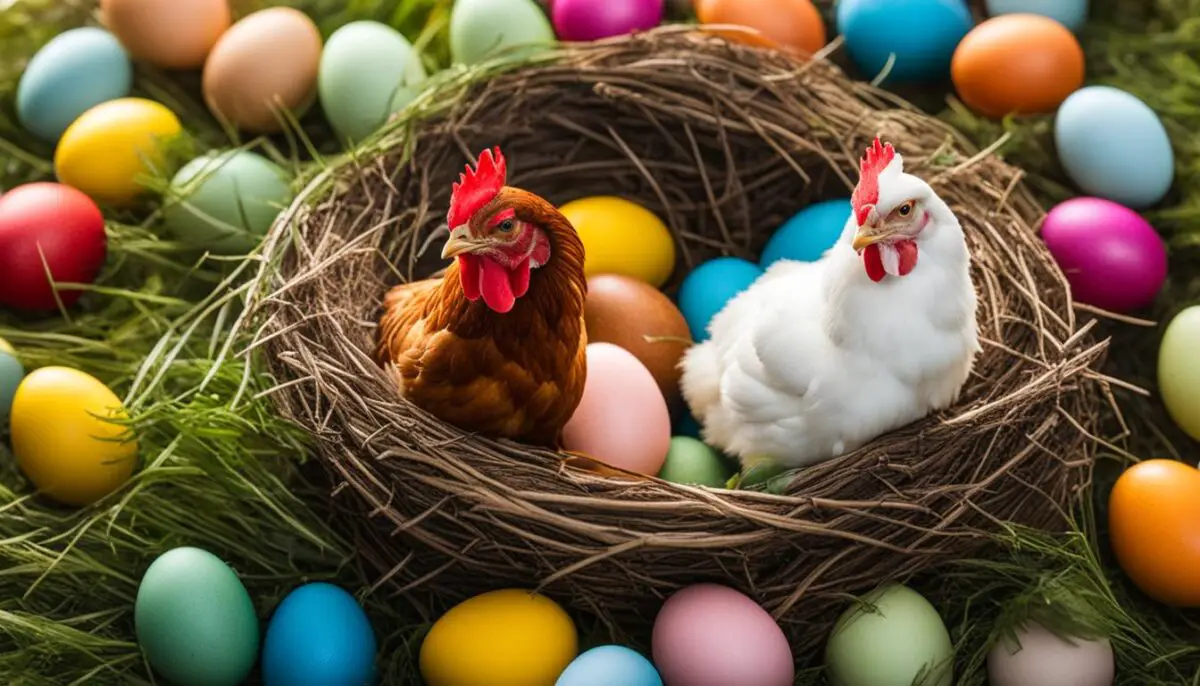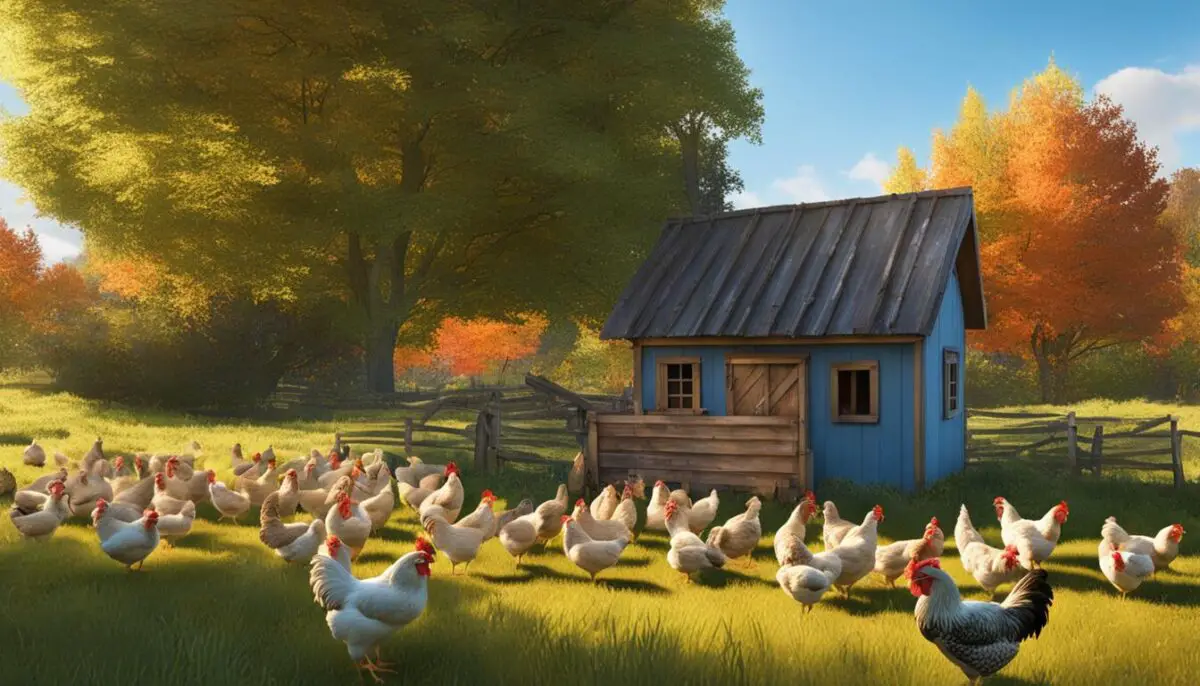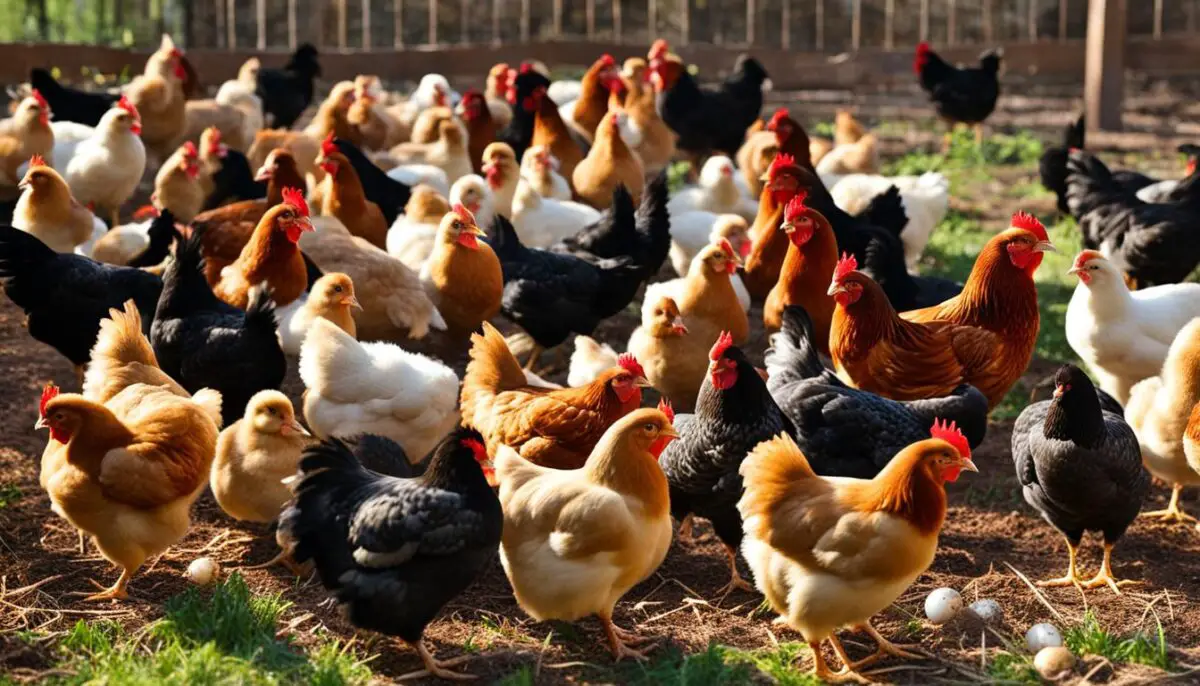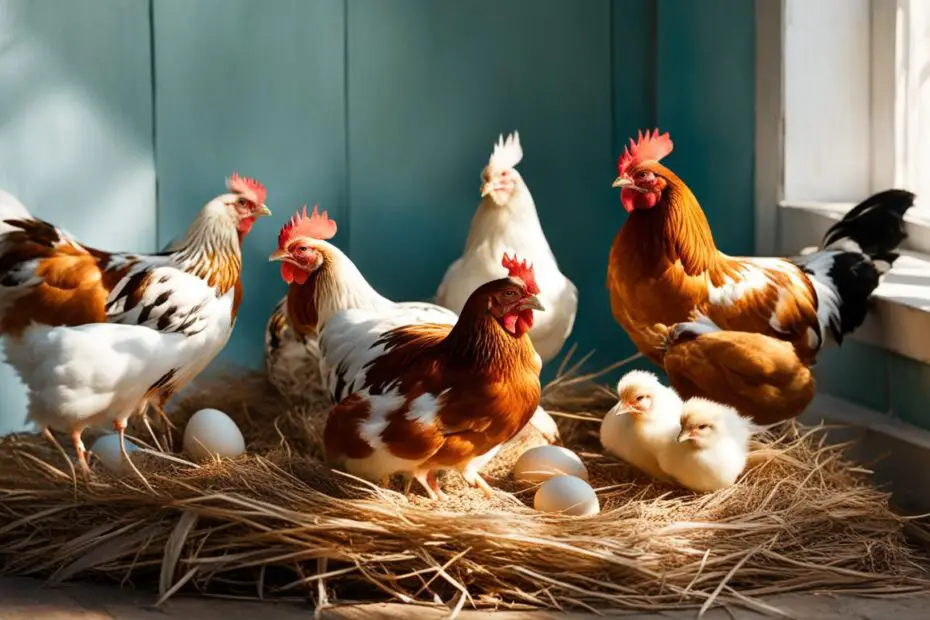Have you ever wondered how long chickens lay eggs for? The egg laying cycle of chickens is a fascinating process that spans a specific time period. Understanding the duration of egg laying in chickens is essential for backyard flock owners to maintain a productive and healthy flock.
Chickens have a lifespan of 6-8 years, on average. During this time, they typically produce eggs for about 3-4 years. However, it’s important to note that egg production gradually decreases each year, affecting egg size and shell quality. In commercial settings, most layers are kept for 2-3 years due to declining productivity.
To maintain a productive flock, it is recommended to retire older hens and introduce younger hens every 2-3 years. This helps ensure consistent egg production and a well-balanced flock.
Key Takeaways:
- Chickens typically live for 6-8 years.
- They produce eggs for about 3-4 years.
- Egg production declines each year, affecting egg size and shell quality.
- Most commercial layers are kept for 2-3 years before retirement.
- Introducing younger hens every 2-3 years helps maintain a productive flock.
Factors Affecting Egg Production in Chickens
When it comes to egg production in chickens, there are several factors that can influence the laying cycle and lifespan of egg production. These factors include day length, nutrition, housing conditions, and overall management of the flock.
Hens typically begin laying eggs at around 18-22 weeks old, given optimal conditions. The length of the day and the availability of artificial light play a significant role in ovulation and egg production. Hens require a minimum of 14 hours of daylight to maintain consistent egg laying. As hens age, their egg count gradually decreases, with peak production typically reached around 30 weeks of age.
“The length of the day and the availability of artificial light play a significant role in ovulation and egg production.”
In addition to day length, breed, housing conditions, weather, management practices, parasite load, and nutrition all impact the rate of egg laying in hens. Each of these factors can affect the overall health and productivity of the flock.
Nutrition is particularly crucial for maintaining optimal egg production in chickens. A well-balanced diet that provides all 38 necessary nutrients is essential. Feeding a complete layer feed, such as the Purina® Oyster Strong® System, helps support strong egg production and overall hen health.
Here is a table summarizing the factors that can affect egg production in chickens:
| Factors Affecting Egg Production | Description |
|---|---|
| Day Length | The length of the day plays a significant role in ovulation and egg production. Hens require a minimum of 14 hours of daylight for consistent laying. |
| Nutrition | A well-balanced diet that provides all necessary nutrients is essential for maintaining optimal egg production. |
| Housing Conditions | The overall housing environment, including temperature, ventilation, and space, can influence egg production. |
| Management Practices | The way the flock is managed, including handling, flock density, and parasite control, impacts egg production. |
By understanding and managing these factors, backyard flock owners can help ensure consistent and healthy egg production from their hens. Providing the right conditions, proper nutrition, and appropriate management practices can result in a productive flock that lays eggs for an extended period of time.

Egg-Laying Schedule and Frequency
Understanding the egg-laying schedule and frequency of chickens is essential for backyard flock owners. Hens generally lay one egg per day, as ovulation occurs every 24-26 hours. This means that a rooster is not necessary for egg production. Each egg takes approximately 26 hours to fully form, so hens lay eggs progressively later each day.
It’s important to note that the timing of egg laying is based on the hen’s internal clock and is independent of external factors. Ovulation will occur regardless of whether the previous egg was fertilized or not.
As the day progresses, the timing of egg laying becomes too late for ovulation to occur, resulting in a skipped day or more before the next egg is laid. This daily cycle continues in a repeating pattern, maintaining a consistent schedule for egg production.
Here’s a visual representation of the egg-laying schedule:
| Day | Egg-Laying Time |
|---|---|
| Day 1 | Morning |
| Day 2 | Afternoon |
| Day 3 | Evening |
| Day 4 | Skip |
| Day 5 | Morning |
| Day 6 | Afternoon |
| Day 7 | Evening |
This pattern continues, with the skipped day occurring before the egg-laying cycle restarts. This natural process allows the hen’s reproductive system to rest and prepare for the next round of egg production.
Now that we’ve covered the egg-laying schedule and frequency, let’s explore how seasons can affect egg production in chickens. But before we do that, take a moment to absorb the following image, which captures the beauty of a hen at her nesting box:

Lifespan of Chickens and Egg Production
Chickens can live for several years after they stop laying eggs, with an average lifespan of 8-10 years. However, their egg production decreases as they age.
In their first year, hens reach peak production, laying up to 250 eggs. In the second year, they lay approximately 80% of the previous year’s eggs. By the third year, production drops to under 70%, and by the fourth year, it decreases to about 60% of the initial production. Individual chickens can vary in their egg-laying lifespan.
Comparison of Egg Production Over the Years
| Year | Egg Production |
|---|---|
| First | Up to 250 eggs |
| Second | Approximately 80% of the previous year’s eggs |
| Third | Under 70% of initial production |
| Fourth | About 60% of initial production |
As chickens get older, it’s important to monitor their egg-laying capacity and consider retiring them from egg production. By introducing younger hens every 2-3 years, you can maintain a productive flock.

Feeding and Nutrition for Egg Laying
Proper nutrition is vital for maintaining optimal egg production in chickens. Providing the right chicken feed for egg production is essential to meet the nutritional needs of laying hens. A complete layer feed that contains all 38 necessary nutrients is the foundation of a hen’s diet. This ensures they receive the essential vitamins, minerals, and proteins necessary for egg production and overall health.
Purina® complete layer feeds, such as the Oyster Strong® System, are specifically formulated to support strong egg production and the overall well-being of hens. These feeds are carefully balanced to provide the ideal combination of nutrients required for maximum egg production and shell quality. The Oyster Strong® System, for example, includes added calcium from oyster shells, which helps strengthen eggshells.
When it comes to feeding laying hens, it’s important to consider their consumption rate. On average, laying hens consume approximately 0.25 pounds of feed per day. However, this can vary depending on factors such as the size of the hen, environmental conditions, and the type of feed provided. Monitoring the feed intake and making necessary adjustments ensures that each hen receives adequate nutrition to support egg production.
While treats can be tempting to offer, it’s crucial to limit them to maintain a balanced diet. Excessive treats can lead to reduced consumption of the complete layer feed, which can result in nutrient deficiencies. To avoid this, limit treats to no more than 2 tablespoons per day. This ensures that hens rely on the complete layer feed as their main source of nutrition and receive all the necessary nutrients to lay quality eggs.
Feeding Schedule Example:
Here’s an example of a feeding schedule for laying hens:
| Time | Feed Type |
|---|---|
| Morning | Complete Layer Feed |
| Afternoon | Complete Layer Feed |
| Evening | Complete Layer Feed |
Remember, providing the optimal diet for egg-laying chickens is essential for maintaining their health and productivity. A well-balanced and complete layer feed, like the Purina® Oyster Strong® System, ensures that hens receive all the necessary nutrition for maximum egg production and overall well-being.
Conclusion
After examining the lifespan and egg production duration of chickens, it is clear that these factors greatly impact the productivity of backyard flocks. Chickens typically live for 6-8 years, with their egg-laying period lasting around 3-4 years. However, it’s important to note that egg production decreases each year, affecting both the quantity and quality of eggs.
Various factors, including day length, nutrition, and overall management, influence the rate of lay in hens. Providing optimal conditions, such as the right amount of light and a balanced diet, can help maximize egg production. It’s recommended to introduce younger hens every 2-3 years to maintain a productive flock, as older hens may experience a decline in egg production.
In terms of egg-laying schedule and frequency, hens typically lay one egg per day, with ovulation occurring every 24-26 hours. Although artificial light supplementation can extend egg production during different seasons, hens naturally slow down their production in the fall and winter months. By understanding these patterns and providing appropriate care, backyard flock owners can better manage their chickens’ egg-laying activities.
To support optimal egg production, it’s crucial to ensure hens receive proper nutrition. Feeding them a complete layer feed that contains all the necessary nutrients is essential. Brands like Purina® offer complete layer feeds, such as the Oyster Strong® System, to support strong egg production and overall hen health. Additionally, limiting treats and focusing on the complete layer feed helps ensure hens receive the required nutrition for sustained egg production.
FAQ
How long do chickens lay eggs for?
Chickens typically lay eggs for about 3-4 years.
What is the egg laying cycle of chickens?
The egg laying cycle of chickens lasts for approximately 3-4 years.
What is the time span of egg production in chickens?
Chickens produce eggs for about 3-4 years.
How long is the duration of egg laying in chickens?
The duration of egg laying in chickens is usually around 3-4 years.
What is the lifespan of chicken’s egg production?
The lifespan of chicken’s egg production is typically around 3-4 years.
How many years do chickens lay eggs?
Chickens lay eggs for an average of 3-4 years.
What is the average egg laying duration in chickens?
The average egg laying duration in chickens is about 3-4 years.
What is the egg laying period in poultry?
The egg laying period in poultry lasts for approximately 3-4 years.
How do factors affect egg production in chickens?
Several factors, including day length, nutrition, housing, and overall management, can affect egg production in chickens.
Why does egg laying decrease in chickens?
Egg laying decreases in chickens due to factors such as age, affecting egg size and shell quality, and declining egg production over time.
What influences the rate of lay in hens?
The rate of lay in hens is influenced by factors such as breed, housing, weather, management, parasite load, and nutrition.
How often do hens lay eggs?
Hens generally lay one egg per day, as ovulation occurs approximately every 24-26 hours.
Is a rooster necessary for egg production in chickens?
No, a rooster is not necessary for egg production in chickens. Egg production is independent of fertilization.
How long does it take for an egg to fully form in a hen?
It takes approximately 26 hours for an egg to fully form in a hen.
Can artificial light extend egg production in chickens?
Yes, artificial light supplementation can extend egg production in chickens during the spring, fall, and winter seasons.
What is the effect of day length on a hen’s ovulation and egg production?
The length of the day influences a hen’s ovulation and egg production. Maximum egg production is typically achieved during summer days with 16 hours of daylight.
How long do chickens live after they stop laying eggs?
Chickens can live for several years after they stop laying eggs, with an average lifespan of 8-10 years.
How does nutrition impact egg production in chickens?
Proper nutrition, including feeding a complete layer feed that provides all necessary nutrients, is vital for maintaining optimal egg production in chickens.
What should be included in the diet of laying hens?
Laying hens should be fed a complete layer feed, such as Purina® Oyster Strong® System, that provides all necessary nutrients for strong egg production and hen health.
How much feed do laying hens consume per day?
Laying hens typically consume approximately 0.25 pounds of feed per day.
Can treats be given to laying hens?
Treats should be limited to no more than 2 tablespoons to ensure that hens receive the necessary nutrition from their complete layer feed.
What is the lifespan of egg-laying chickens?
Egg-laying chickens have a lifespan of 6-8 years.
How long do chickens lay eggs for on average?
On average, chickens lay eggs for about 3-4 years.
What is the duration of egg-laying for chickens?
The duration of egg-laying for chickens is typically around 3-4 years.
What is the conclusion on chicken egg laying lifespan?
Chickens usually lay eggs for about 3-4 years, with egg production decreasing as they age.
Can you provide a summary of the chicken egg production duration?
Chickens lay eggs for an average of 3-4 years, with peak production usually reached around 30 weeks of age.
